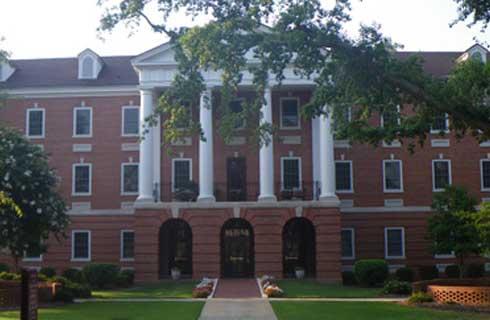物理学哲学博士
Doctor of Philosophy in Physics

学历文凭
Ph.D.

专业院系
School of Arts and Sciences

开学时间

课程时长

课程学费

国际学生入学条件
Online Application Form.
R'sum.
Statement of purpose.
Three letters of recommendation.
Official transcripts.
GRE test scores.
General GRE is required.
For international applicants, an English proficiency test is required.
Minimum test score requirements: TOEFL (80) and TOEFL Essentials (8.5), IELTS (6.5), PTE (56) or Duolingo English Test (115).
The English language-testing requirement is not waived based on language of instruction, nor do we accept university certificates. English testing is waived if an applicant has a degree from a country where English is the Native Language. Click here to see the list of these countries.
Prerequisites: Applicants must have a BS or equivalent degree in physics or a closely related subject. Applicants are expected to have a cumulative GPA of 3.0 or higher at the time of application. Furthermore, applicants should have achieved a grade of B+ or better in all physics and math subjects taken.
For those seeking Teaching or Research Assistantships:
A GRE score of at least 319 is recommended (minimum verbal score of 156 and minimum quantitative score of 163).
GRE Physics Subject Test scores are not required but are recommended.
International applicants should have a minimum score of 26 in each section of the TOEFL, 7.0 on each band of the IELTS (with a minimum Speaking band of 7.5) or comparable PTE or Duolingo English Test scores.
MS students interested in pursuing the PhD will be required to sit for the placement test offered by the Department of Physics. This is offered annually in August. This score, in addition to prior academic record, publications and teaching performance, will be considered prior to formal admittance into the PhD program.
IDP—雅思考试联合主办方

雅思考试总分
6.5
- 雅思总分:6.5
- 托福网考总分:80
- 托福笔试总分:160
- 其他语言考试:PTE (56) and Duolingo English Test (115)
CRICOS代码:
申请截止日期: 请与IDP联系 以获取详细信息。
课程简介
A PhD in Physics from Clarkson University gives you the training and resources to become an independent scholar in a specialized subfield. Through the program, you will apply advanced knowledge in core areas of classical mechanics, electromagnetism and quantum mechanics to uncover out-of-the-box solutions. You will gain the theoretical foundations to conduct experimental investigations with a high degree of expertise. By the time you graduate, you will be ready to lead research teams in academia or industry.<br>The PhD in Physics offers rigorous research training and complex coursework meant to challenge your understanding of the field. You will be able to choose from different specialization areas to deepen your expertise and tackle a wider set of issues through interdisciplinary work with faculty and peers across campus.<br>One of the hallmarks of our department is the personalized attention we offer students. We keep our class sizes small, encouraging collaboration and solutions that require teamwork. Your research advisor will provide comprehensive guidance, and you will further benefit from a friendly and open relationship with other faculty members. We value your input and ideas and treat you as a fellow scholar.<br>Despite our size, we offer the resources of a much larger university. You will have access to state-of-the-art research centers and the opportunity to participate in innovative projects led by a diverse team of experts. You will also gain valuable teaching experience by working with undergrads as a teaching assistant or in other capacities.<br>The PhD in Physics consists of a minimum of 90 credit hours. At least six of those credit hours should be taken outside the department and at least six of those credit hours should be dedicated to seminars.<br>Within two years of full-time study, or 66 credit hours if you are a part-time student, you will take the required Comprehensive Exam. The topics covered in the exam include classical mechanics, electricity and magnetism, optics, thermal physics, quantum mechanics and modern physics (relativity, nuclear and solid-state).
相关申请
 预科
预科 奖学金
奖学金 实习机会
实习机会 在校学习
在校学习 跨境学习
跨境学习 校园授课-线上开始
校园授课-线上开始 在线/远程学习
在线/远程学习
开学时间&学费
学费信息仅供参考,请与IDP联系以获取详细信息
| 开学时间 | 时长 | 学费 | 地点 |
|---|
关于克拉克森大学

克拉克森大学创建于 1896年,位于美国纽约州的波茨坦,是一所历史悠久的综合性私立大学,是美国新闻与世界报道2003年全美最优秀的学院之一,提供课程广泛的高等教育。克拉克森大学是独立技术大学联合会17个成员中的一位,该联合会是全美最著名的科技大学组织之一。其中学校的商科项目提供的一系列管理课程位列13名。克拉克森大学一共有3000名学生,195名教师。克拉克森大学的主要科研机构有:国家航空和宇宙航行局的分支机构、商业发展研究中心、高级材料研究中心等。学校还有管理学院、理学院、工程学院等研究生院和卫生科学中心。工程学院的主要专业有化学工程、土木与环境工程、电气与计算机工程、力学与航空工程,理学院的主要专业有基础科学、化学、数学、物理学。学校可以授予硕士 和 博士学位。纽约州面积为128,401平方公里,在五十州内列第30位。根据2003年人口普查,纽约州有1,900多万人,是全美人口第三多的州。重要城市有纽约,罗彻斯特,水牛城,奥尔巴尼,雪城等。波茨坦市人口约为一万人,距离纽约市约350英里,距离加拿大的渥太华和蒙特利尔市不到100英里,平均气温在-8.7至27.1度左右。克拉克森大学(Clarkson University)在美国大学排名2012为第119名。
本校相关课程

化学工程理学硕士
学历文凭
Masters Degree
开学日期
课程费用总额


Master of Science in Electrical and Computer Engineering
学历文凭
Masters Degree
开学日期
课程费用总额


工程科学理学硕士
学历文凭
Masters Degree
开学日期
课程费用总额


Master of Science in Mechanical Engineering
学历文凭
Masters Degree
开学日期
课程费用总额


Master of Science in Basic Science
学历文凭
Masters Degree
开学日期
课程费用总额


化学科学硕士
学历文凭
Masters Degree
开学日期
课程费用总额

其他相关课程

物理学哲学博士-量子信息
 滑铁卢大学
滑铁卢大学学历文凭
Ph.D.
开学日期
课程费用总额


物理学理学硕士-量子信息
 滑铁卢大学
滑铁卢大学学历文凭
Masters Degree
开学日期
课程费用总额


物理学哲学博士
 滑铁卢大学
滑铁卢大学学历文凭
Ph.D.
开学日期
课程费用总额


物理学理学硕士
 滑铁卢大学
滑铁卢大学学历文凭
Masters Degree
开学日期
课程费用总额


物理学理学士(荣誉学位)
 滑铁卢大学
滑铁卢大学学历文凭
Bachelor Degree with Honours
开学日期
课程费用总额


物理学理学硕士
 劳伦森大学
劳伦森大学学历文凭
Masters Degree
开学日期
课程费用总额










 美国
美国